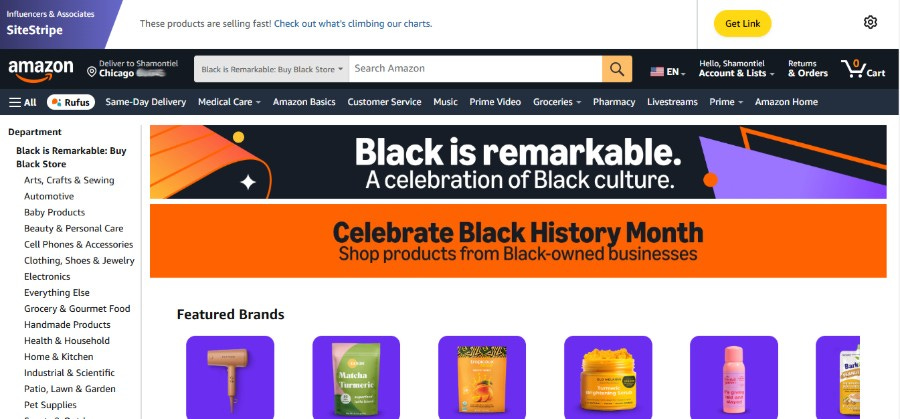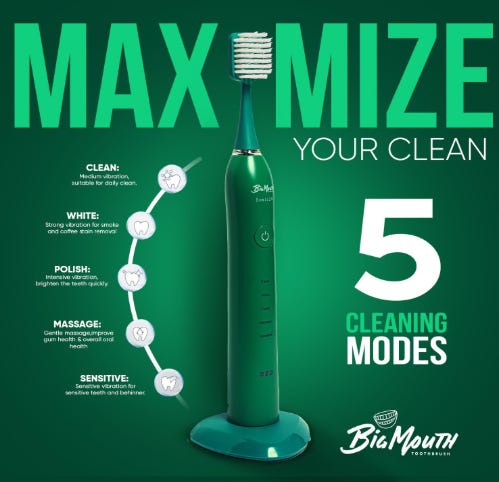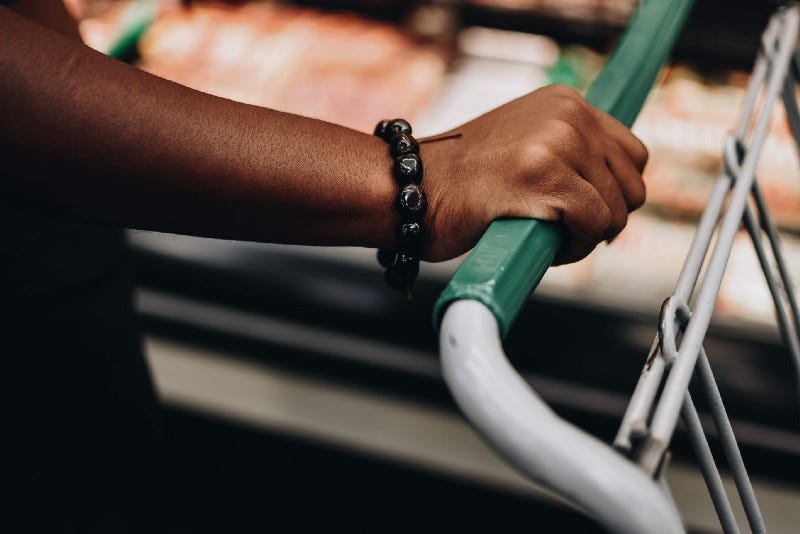Black-owned businesses can survive without anti-DEI Target
Black consumers, be careful with Black-owned businesses who care more about luxury than equality
When I heard the news about Target removing diversity, equity and inclusion (DEI) language and promotions, my first thought was, “And?” This retail chain has been problematic to me since 2019. When one store became my go-to after dodging another one, it seemed like all the racial profiling co-workers figured out they should work at the second store during the pandemic. After a report to the Better Business Bureau in 2023, I tapped out completely.
Still, I understand why some Black-owned businesses may want you to still shop there so Target doesn’t have an excuse to stop selling their products. Then, those same Black-owned and woman-owned businesses will be back to square one. Still, the products, the talent and (assuming this is applicable) their Internet visibility doesn’t disappear because they’re no longer at Target. Be wary of any company (or person) that tells Black consumers to continue to shop at an anti-DEI organization only to then continue to promote more anti-DEI companies. At some point, you’ll have to wonder, “Are we supporting Black businesses or did you just want a Cadillac?”
So is it hypocritical of me to continue to promo Amazon products, knowing they’ve removed DEI language? I’m having an internal fight with this one. On one hand, like retail chains, the convenience, the pricing and the accessibility makes it easier for people to buy items they can’t get in their own neighborhoods — and yes, that includes Amazon’s convenience.
ADVERTISEMENT ~ Amazon
As an Amazon Affiliate, I earn a percentage for each purchase with my referral links.

On the other hand, I really like how easy it is to find woman-owned, Black-owned and other marginalized-group owned products on Amazon. I especially like spreading the word about them. Library books may have taken their pan-African flags off of Black books but online stores still see the significance of not trying to blend everything in. For now, and as long as I can see Black-owned and woman-owned businesses, I’ll continue to partner with Amazon.
The following post (below) was originally written on February 6, 2020.
Writer’s note: Initially when I wrote this post (Feb. 6), I had no intention of mentioning the store chain nor location (Target, 2209 Howard St., Evanston, IL). But I went in there today (Feb. 11) to see if anything had changed since my last visit. Per usual, the suffocating behavior continues. The self-checkout rep (the same lady who decided it was “too many people in line” the last time I was there) immediately walked over to fiddle with brand new bags at my register, wanted to know why I didn’t have a bag, and came back to stare at me when I purposely got back in line to buy a handful more items.
Other customers (all white) completed their transactions without interruption. When I finished paying, she conveniently walked away from the register I was paying from. I’ve had enough. I’m naming names, filling out the survey, writing to headquarters and the Better Business Bureau, and I’m never going to this store location again.
Recommended Read: “Post-COVID, are retailers getting amnesia about drive-ups and curbside pick-ups? ~ Has the worldwide pandemic forever changed customer attitudes?”
I love one particular store chain*. They have my favorite vegetarian items, household products, electronics and beauty essentials. Being able to find a combination of all four perks is important to me. I’m not the kind of consumer who wants to go to eight different stores to grocery shop. My weekly grocery runs are at this popular discount chain* and a higher-end grocer, then pretty much everything else is bought online. But I have a bone to pick with one store location, and it’s primarily due to the self-checkout experience. I dodge it unless I’m already nearby (and usually drive past it even then), primarily because I am profiled by store employees and/or management every time.
ADVERTISEMENT ~ Amazon
As an Amazon affiliate, I earn a percentage from purchases with my referral links. I know some consumers are choosing to boycott Amazon for its DEI removal. However, after thinking about this thoroughly, I choose to continue promoting intriguing products from small businesses, women-owned businesses and (specifically) Black-owned businesses who still feature their items on Amazon. All five of my Substack publications now include a MINIMUM of one product sold by a Black-owned business. (I have visited the seller’s official site, not just the Amazon Black-owned logo, to verify this.) If you still choose to boycott, I 100% respect that decision.
I’m no stranger to retail. In college, I worked for Walgreens (two years as a cashier, a few months as a photo tech). During spring and winter breaks, I was a cashier and gift wrapper at Borders Books, Music and Cafe. Immediately after graduation, I worked for Walmart (eight months as a photo tech).
Recommended Read: “Could more bookstores survive if they act like libraries? ~ Are libraries helping millennials be even more antisocial?”
So ringing items up, checking prices, correct bagging and price verification is not new to me. It’s the primary reason I prefer self-checkout. I can get in and out, knowing full well my manufacturing coupons were used correctly, the prices are accurate, the bags are not stuffed to capacity and store membership points are credited. The only problem I have is related to the employees at self-checkout in this location — either management and/or the employees have a tough time understanding the self part of self-checkout. In turn, I end up frustrated after every visit to this store location, so I drive past it 99.9 percent of the time during my next grocery run.
ADVERTISEMENT ~ Amazon
As an Amazon affiliate, I do earn a percentage from each sale while using my referral links.

When the self-checkout profiling began
It started off small. First there was the white, female cashier who stood behind me to watch me ring up every item. Then there was the cashier who wanted to “help” bag items for me at self-checkout, but not the other three (white) customers purchasing their items. Then there was the cashier who jogged over when I accidentally scanned an avocado instead of typing in the code, loudly yelling, “I knew you would do that!” By incident number three (same cashier all three times), I walked away altogether and she asked me about paying. Meanwhile an older white lady was waving her hand for assistance.
I told her if she got out of my face and helped that lady, I would. Needless to say, she left me alone after that. But that didn’t stop one manager (non-black and male) from deciding he wanted to lean on a store shelf and just stare at me. I pondered on whether the cashier was so annoying because of a direct order.
And even when that cashier disappeared, in came another one (also white and female) with the same overachieving behavior. This new one decided there were “too many people” in line (I was the only one in line but all four self-checkout registers were being used) and asked if she could ring me up with a hand-held checkout gun. This resulted in the lady ringing me up for too many items, not scanning my store points, me forgetting about my manufacturing coupons and her clumsily snatching an empty bag (from a now-empty self-checkout register) to complete the process. I ended up in Customer Service to fix everything and get a refund.
Racial profiling doesn’t stop when you work in retail

While it’s difficult to narrow down whether I’m dealing with overbearing cashiers or whether the cashiers are following orders from management, I’ve seen this behavior on both sides.
When I worked at Border’s, I knew who the plainclothes officers were. I also knew of co-workers who would call the officers’ “book seller” names over the loudspeaker, requesting that they go to certain aisles. “Becky, you have a customer waiting in the Fiction aisle.” That went on and on until one black female officer got fed up and requested that this same cashier stop calling her over to only black customers, who rarely if ever were doing anything wrong — other than reading entirely too many magazines for free. Still though, there is an issue that needs to be discussed in retail. Starbucks may have employees who racially profile, but that restaurant chain’s employees are clearly not the only ones who pull these stunts.
Recommended Read: “My love-hate relationship with cashless stores ~ How retailers are working for and against making a profit”
From a business perspective, I understand the frustration. Retail stores deal with $48.9 billion in shoplifting and employee theft annually. And some of that employee theft may be a matter of them doing it or a friend sneaking something out. But there is an underlying bias about who is doing the stealing that is often known and quickly ignored.
I’ve dealt with that too. Two college (black and male) associates of mine entered Walgreens on a particularly slow night. One apparently went to the back to steal condoms while the other guy stayed upfront to talk to me at the front register. At the end of my shift, a (white and male) manager decided to tell me a random “fictional” story about why it’s not OK to help your friends steal. I had absolutely no idea why he was telling me this. When I was putting my coat on to leave, I was informed that a box of condoms was gone. Then the reason behind that “fictional” story sunk in.
Recommended Read: “When black employees are accused of theft ~ If the customer is black and the employee is black, that doesn't mean they're in cahoots”
Although the manager and I never spoke about it anymore, I felt a way about how he handled the matter. The thought that I had no idea what was going on never seemed to enter his mind. I glared at him every single time we made eye contact after that, and neither of us spoke to each other for the rest of the time I worked there. I didn’t appreciate his assumption. An email pep talk from my father — who also didn’t appreciate the “story” — kept me from quitting though. I did, however, find both of the college associates on campus. I talked (read: yelled) at them for putting me in a position I had no idea I was in. They listened. And I never saw them in the store again.
Why a race sensitivity training course would do retailers some good
Frankly, not every employee is unaware of internal theft. And not every customer — in and out of the self-checkout aisle — is honest. I get it. But retailers do themselves a disservice by profiling certain customers (and employees) without any shred of evidence that something is suspicious. I’ve long left working in retail — that was 16 years ago. But I’m still bothered by the “Becky at Borders” and “fictional” story incidents. Those were clear incidents in which a race sensitivity training course could’ve gone a long way, or at least called managers and cashiers out on their behavior.

Under no circumstances do I want to insinuate that all white employees profile black consumers and fellow employees. These are isolated incidents — that left a lasting impression. Still though, as a consumer, I have to deal with these attitudes in stores and at self-checkout. However, when I see employees (mainly white as well) at a much-better and bigger location for this same store chain who smile, wave and step back politely to let me ring my items, it proves that there is a much more professional and productive way to handle store theft. This group comes over when asked. I don’t feel them breathing down my neck during each transaction.
It’s OK for retailers to keep employees nearby for questionable behavior. It’s OK for retailers to want to keep theft down. But if one location’s employees can politely step back and quietly observe (similar to Becky at Border’s), then employees at this store location should be able to do so, too. Don’t lose honest customers because some of your workers have overactive imaginations and racist mindsets.
Did you enjoy this post? You’re also welcome to check out my Substack columns “Black Girl In a Doggone World,” “BlackTechLogy,” “Homegrown Tales,” “I Do See Color,” “One Black Woman’s Vote” and “Window Shopping” too. Subscribe to this newsletter for the weekly posts every Wednesday. Thanks for reading!









